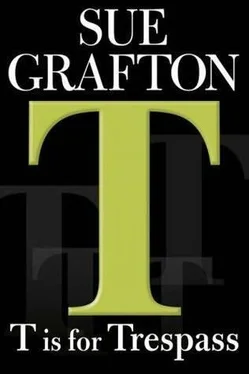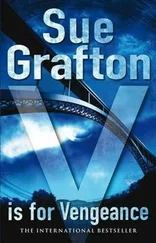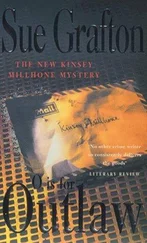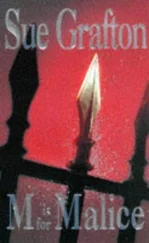“I can check with the other POs and see if they know him. What’s the context?”
“You know an attorney named Lowell Effinger?”
“Sure, I know Lowell.”
“He wants to depose Downs as a witness in a personal-injury suit. Downs is a hard man to find, but I finally ran him to ground. He seemed cooperative at first, but then he turned around and bolted so fast it made me wonder if he was in the system somewhere.”
“I don’t think here, but he might be a fugitive from another state. These guys want out from under, all they have to do is hit the road without telling us. We’ve got ten to fifteen unaccounted for at any given time. And that’s just locally. Statewide, the numbers are mind-boggling.”
“Jeez, all those sex offenders on the loose?”
“Sorry to say. Give me your number again and I’ll get back to you if I learn anything.”
I thanked her and returned the handset to the cradle. My suspicions hadn’t been confirmed, but she hadn’t shot me down. Altogether, I was feeling a flicker of encouragement.
As a consequence, early Thursday afternoon, I drove up Capillo Hill again and sat in the parking lot of the organic foods market, looking out at the intersection where I’d seen Downs two days before. Since his work schedule seemed consistently Tuesdays and Thursdays, I hoped I had a decent chance of spotting him. I was bored to tears with the hunt, but I’d brought a paperback novel and a thermos of hot coffee. There was a ladies’ room available at the gas station two doors down. What more did a girl require? I read for a while, periodically glancing through the windshield to scan the area.
I paid a visit to the service station, and as I came out of the ladies’ room I could see activity across the street. A van pulled in at the curb in front of the laundromat. Idly, I watched as two men got out and went in. I was already sitting behind the wheel of my car again when they emerged minutes later, toting cardboard boxes, which they stowed in the rear of the van. There was lettering on the side panel, but I couldn’t read what it said. I reached into the backseat and snatched up the binoculars I keep close at hand. I adjusted the focus until the lettering became sharp.
Starting Over Christian Charities, Inc.
Your trash is our cash.
We accept gently used clothing, furniture,
small appliances and office equipment.
Tues amp; Thurs, 9:00 A.M. to 2:00 P.M.
Apparently the two men were picking up donations. From a laundromat? How weird was that? It was the phrase “small appliances” that caught my attention. Also, the days and times of operation. This was the perfect position for someone like Downs with a penchant for tinkering and a talent as a fix-it man. I pictured him with nonfunctioning vacuum cleaners, hair dryers, and electric fans, salvaging items that would otherwise go into the trash. A Christian charity might also be sympathetic to his prison history.
I tossed my book aside, got out of my car, and locked it behind me. I made a beeline for the crosswalks in the middle of the block. When I reached the storefront, I bypassed the big plate-glass windows and cut between two buildings to the alley in the rear. I’d driven the alley twice, making a study of pedestrians while navigating the lane and a half, barely wide enough for two cars to pass. Once I’d had to stop at that spot when a woman in front of me with a carload of kids slowed to make the turn into her garage.
Now that I knew what I was looking for, the payoff was quick. Above the back door of the laundromat, there was the same sign I’d seen on the side of the van. This was a drop-off location for Starting Over, an organization that must have rented the two back rooms to accept and sort donations. The rear parking had slots enough for three cars with additional space for a lidded bin that was kept available for hours when the center was closed. The rolling bin had been placed across the opening between the laundromat and the jewelry store next door. I could see the back end of the vehicle that was parked in the gap. It was one I knew well: an old milk truck outfitted as a camper, originally offered for sale “as is” at $1,999.99. The dealer who sold it had operated the lot right around the corner from the residence hotel where Downs had lived. I might have actually witnessed the transaction the day I saw the salesman in conversation with a white-haired man in sunglasses and a porkpie hat. I hadn’t met Melvin at that point so I wouldn’t have understood the significance. By the time I’d caught up with him, he was prepared to flee. I took out my notebook and jotted down the license number of the milk truck.
The rear door of the shop stood ajar. I approached with care and peered around the corner. Melvin had his back to me, folding children’s clothing into tidy piles that he placed in a cardboard box. Now that I knew where he was, I’d report his location to Lowell Effinger. He’d schedule a date for the deposition and issue a subpoena requiring Downs to appear. I made a note of the address and the contact number printed on the bin and then returned to my car and drove back to my office, where I put in a call to the attorney’s office and told his secretary where Downs could be served.
“You’ll handle the service?”
I said, “That’s not a good idea. He knows me on sight, which means I’d be coming in the front door and he’d be flying out the back.”
“But this is your baby. You should have the satisfaction,” she said. “I’ll let you know when everything’s set up, which shouldn’t take long. By the way, Gladys told Herr Buckwald there was talk of a missing witness and now she’s all over us for his name and address.” I was amused by her fake German accent, which exactly captured Hetty Buckwald’s nature.
“Good luck,” I said. “Call me when you’re done.”
“I’m on it, kid.”
Driving home that afternoon, I became aware of the tension in my neck. I was wary of Solana and hoping to avoid running into her again. She had to be aware I had her in my sights and I didn’t think she’d appreciate the interference. As it turned out, our paths didn’t cross until Saturday night. So I was worrying before it was absolutely necessary.
I’d been to see a movie and it was close to eleven when I got home. I parked half a block down the street in the only space I could find at that hour. I got out and locked the car. The street was dark and empty. A skittish wind blew, sending a tumble of leaves across my feet like an undulating wave of mice escaping from a cat. The moon was intermittently visible, obscured and then exposed by the erratic movement of the trees. I thought I was the only one out, but as I approached Henry’s gate, I caught sight of Solana standing in the shadows. I secured my shoulder bag and shoved my hands in the pockets of my parka.
She stepped forward when I was abreast of her, blocking my path.
I said, “Get away from me.”
“You put me in hot water with the county. A bad move on your part.”
“Who’s Cristina Tasinato?”
“You know who she is. Mr. Vronsky’s conservator of record. She says you paid a visit to her attorney. Did you think I wouldn’t find out?”
“I don’t give a rat’s ass.”
“Bad language is unbecoming. I gave you more credit than that.”
“Or maybe you didn’t give me credit enough.”
Solana stared at me. “You were in my house. You picked up Mr. Vronksy’s pill bottles to see what medications he’s on. You set the bottles down not quite in the same place so I could tell they’d been moved. I pay attention to such things. You must have thought you were immune from discovery, but you’re not. You took his bankbooks as well.”
“I don’t know what you’re talking about,” I said, but I wondered if she could hear my heart careen off my chest wall like a handball.
Читать дальше












